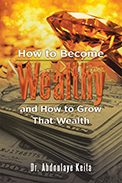
 |
Keita’s work is highly comprehensive in nature, covering the spectrum of pathways to wealth growth from a global prism. In many ways, the tenets of this work, while imbued in wealth growth, are aimed at the well-being of all life’s species. Though the content in question is undoubtedly complex, Keita has a knack for simplifying these dense models and breaking them down using concrete, modern-day examples that even the layman can understand. In reality, a simple tradeoff of a paycheck for time served is the antithesis of growing wealth. Recognizing this, Keita aggregates data and examples using the central premise of scientific inquiry.
The author’s work is immersed in literature reviews and hypotheses that provide a complete picture of how one can emulate the teachings from this book in one’s daily life. From breaking down asset classes like stocks and bonds and digging deeper into the pros and cons of social business, Keita’s theories progress to the role of technology and trust in the workplace. Unquestionably, these are heavy topics, and understanding even one of these elements can certainly project benefits for individuals. The author’s adeptness and expertise with the material are apparent as he aptly discerns which models or examples will translate the most naturally with readers. References include, but are not limited to, Adam Smith and his The Wealth of Nations, key English economist John Keynes, and Japanese organizational theorist Kenichi Ohmae.
RECOMMENDED by the US Review